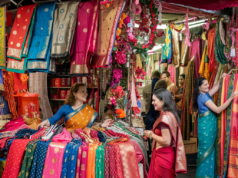Starting a dropshipping business for sarees can be an excellent opportunity to enter the e-commerce space with minimal upfront investment. This traditional Indian garment has global appeal, making it an attractive product to sell online. Here’s a comprehensive guide to help you launch your saree dropshipping business.
Understanding the Saree Market
Before diving in, it’s important to understand the saree market:
- Sarees come in countless varieties, fabrics, and price points (silk, cotton, georgette, chiffon, etc.)
- Different regions of India specialize in distinct saree styles (Banarasi, Kanjivaram, Chanderi, etc.)
- Seasonal and trending designs can significantly impact sales
- Customer preferences vary widely based on region, occasion, and demographics
Setting Up Your Dropshipping Business
1. Research and Planning
Start with thorough market research:
- Identify your target audience (Indian diaspora, fashion enthusiasts, etc.)
- Analyze competitors selling sarees online
- Determine which saree types will be your focus
- Establish your unique selling proposition
2. Find Reliable Suppliers
For sarees, you’ll want to connect with suppliers who:
- Provide authentic products
- Offer good variety and quality
- Ship reliably and efficiently
- Have experience with international shipping if you’re targeting global markets
Look for suppliers in major textile hubs in India such as Surat, Varanasi, Chennai, and Mumbai.
3. Create Your Online Store
Select an e-commerce platform that suits your needs:
- Shopify, WooCommerce, or BigCommerce are popular options
- Choose a professional theme that showcases fabric details well
- Create detailed product descriptions highlighting fabric, work, and styling tips
- Invest in high-quality product photography that shows draping styles
4. Set Up Your Business Legally
Ensure your business is properly registered:
- Obtain necessary business licenses
- Set up a business bank account
- Understand import regulations if dealing internationally
- Familiarize yourself with textile product labeling requirements
5. Implement Marketing Strategies
Develop a comprehensive marketing plan:
- Use social media platforms like Instagram and Pinterest to showcase sarees visually
- Implement SEO strategies targeting specific saree types and occasions
- Consider influencer partnerships with fashion bloggers
- Create content around styling tips, saree draping tutorials, and cultural significance
6. Provide Excellent Customer Service
For saree dropshipping specifically:
- Offer detailed size guides and measurements
- Provide clear information about fabric care
- Be transparent about shipping times, especially for international orders
- Create helpful content about selecting the right saree for different body types and occasions
Challenges and Solutions in Saree Dropshipping
Challenge 1: Quality Control
Since you won’t handle the products directly, establish a quality assessment process with your supplier. Request sample products before listing them on your store.
Challenge 2: Returns Management
Set clear return policies, especially considering sarees are textile products that customers cannot try on before purchasing.
Challenge 3: Cultural Sensitivity
Ensure product descriptions are accurate and respectful of the cultural significance of different saree types.
Scaling Your Saree Dropshipping Business
Once you’ve established your business:
- Expand your product range to include accessories like blouses, petticoats, and jewelry
- Consider offering customization options
- Build an email list for repeat customers
- Introduce seasonal collections to keep your inventory fresh
Starting a saree dropshipping business combines the advantages of a low-overhead business model with the rich market potential of a beloved traditional garment. With careful planning, strong supplier relationships, and thoughtful marketing, you can build a successful online business connecting beautiful sarees with customers worldwide.








